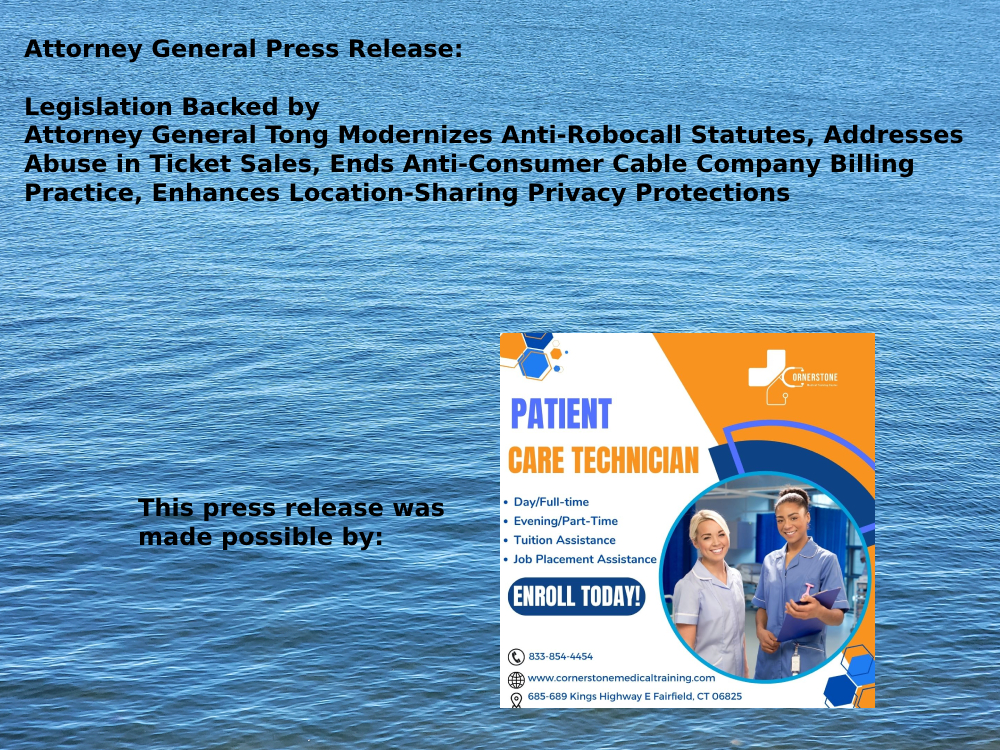Legislation Backed by Attorney General Tong Modernizes Anti-Robocall Statutes, Addresses Abuse in Ticket Sales, Ends Anti-Consumer Cable Company Billing Practice, Enhances Location-Sharing Privacy Protections
(Hartford, CT) – Attorney General William Tong today praised passage in both the state House and Senate of a series of reforms backed by the Office of the Attorney General to strengthen Connecticut consumer protections. The bill includes measures to modernize Connecticut’s anti-robocall statutes, to address abuses in the ticket sale market, to end anti-consumer cable company billing practices, and to enhance privacy protections related to location-sharing data. The bill now heads to Governor Ned Lamont for his signature.
Attorney General Tong thanked Sen. James Maroney, Rep. Mike D’Agostino, Rep. David Rutigliano and Sen. Paul Cicarella for their leadership in the General Law Committee on this bill.
Robocalls
Attorney General Tong has backed new legislation to strengthen Connecticut’s ability to fight obnoxious and intrusive robocalls. The legislation, incorporated into the package now approved by the House and Senate, would modernize the state’s anti-robocall statutes to match new tactics and technology used to inundate Connecticut households with relentless, unwanted calls. Specifically, the proposal expands the statutes to cover text messages, bans “gateway” voice over internet protocol (VoIP) providers from facilitating overseas scammers’ access to the U.S. telecom networks, allows for enforcement action against calls received by Connecticut area codes regardless of where the calls originate, bars telemarketers from contacting Connecticut residents before 9 a.m. and after 8 p.m., strengthens disclosures that telemarketers must make, and clarifies protections provided by the Do Not Call List.
“We’re all sick and tired of the non-stop robocall scams. Our laws need to keep pace with the evolving tactics and technology. This bill is an important step forward towards shutting down the telecom fraud highway and bringing these scammers to justice,” said Attorney General Tong.
Ticket Sales
Following the Taylor Swift ticket sale fiasco, Attorney General Tong proposed reforms to address unfair, anti-consumer ticketing practices in the live event industry. Specifically, the legislation would require the adoption of all-in pricing, where all fees and service charges are disclosed up front so that a consumer can accurately compare the prices of different seats in a venue. It would also require resellers to disclose how much they originally paid for the tickets they are selling.
Connecticut has an active investigation into the live event ticketing industry following widespread concern regarding the recent handling of Taylor Swift concert ticket sales. The Connecticut Office of the Attorney General is unable to comment on that investigation.
“The Taylor Swift concert ticket fiasco was a particularly disastrous example, but these anti-consumer practices have been a longtime problem and need reform. This legislation gives Connecticut new control over this broken industry,” said Attorney General Tong. “We need reform—either through legislatures or the courts.”
Cable Bills
Legislation authored by Senate Majority Leader Bob Duff and backed by the Office of the Attorney General would prevent cable companies, including fiber optic providers, from charging customers through the end of their billing cycles after they cancel subscriptions. Consumers commonly express frustration that they are charged for cable or internet services after cancellation. This bill appropriately ensures that consumers only pay for telecommunications services they receive.
“My office has received hundreds of complaints regarding Connecticut cable companies. One of the recurring complaints we’ve received involves charges that come after consumers cancel their services. No one wants to pay for something they’ve already decided they don’t want. This pro-consumer bill is an important step toward ending these unacceptable practices,” said Attorney General Tong.
Geolocation Data Privacy
Attorney General Tong proposed new legislation to require companies to notify Connecticut residents when their geolocation data is compromised in a data breach. This information poses significant privacy and security concerns as it can reveal intimate details of an individual’s routines, choices, and beliefs, including personal healthcare decisions.
“Our precise location at any given moment can reveal deeply personal details about our daily routines and choices—including our private healthcare decisions. Companies that collect and maintain this information must do so with great care and concern our privacy and security. Connecticut has strong privacy laws on the books, but we need to ensure they stay up to date with current technology and data practices,” said Attorney General Tong.
This press release was made possible by:

